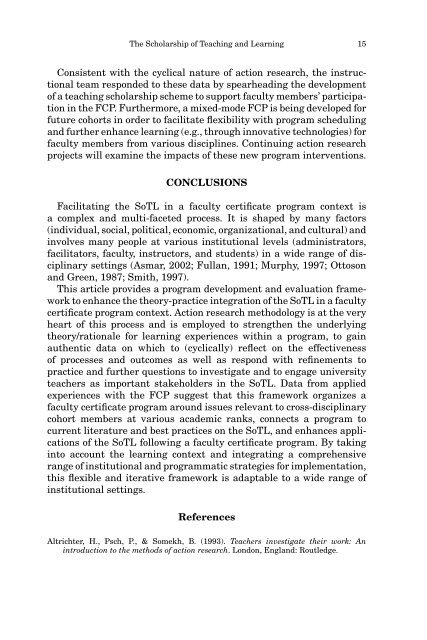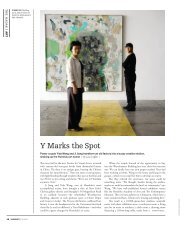The Scholarship of Teaching and Learning: TheoryâPractice - NAIRTL
The Scholarship of Teaching and Learning: TheoryâPractice - NAIRTL
The Scholarship of Teaching and Learning: TheoryâPractice - NAIRTL
Create successful ePaper yourself
Turn your PDF publications into a flip-book with our unique Google optimized e-Paper software.
<strong>The</strong> <strong>Scholarship</strong> <strong>of</strong> <strong>Teaching</strong> <strong>and</strong> <strong>Learning</strong> 15<br />
Consistent with the cyclical nature <strong>of</strong> action research, the instructional<br />
team responded to these data by spearheading the development<br />
<strong>of</strong> a teaching scholarship scheme to support faculty members’ participation<br />
in the FCP. Furthermore, a mixed-mode FCP is being developed for<br />
future cohorts in order to facilitate flexibility with program scheduling<br />
<strong>and</strong> further enhance learning (e.g., through innovative technologies) for<br />
faculty members from various disciplines. Continuing action research<br />
projects will examine the impacts <strong>of</strong> these new program interventions.<br />
CONCLUSIONS<br />
Facilitating the SoTL in a faculty certificate program context is<br />
a complex <strong>and</strong> multi-faceted process. It is shaped by many factors<br />
(individual, social, political, economic, organizational, <strong>and</strong> cultural) <strong>and</strong><br />
involves many people at various institutional levels (administrators,<br />
facilitators, faculty, instructors, <strong>and</strong> students) in a wide range <strong>of</strong> disciplinary<br />
settings (Asmar, 2002; Fullan, 1991; Murphy, 1997; Ottoson<br />
<strong>and</strong> Green, 1987; Smith, 1997).<br />
This article provides a program development <strong>and</strong> evaluation framework<br />
to enhance the theory-practice integration <strong>of</strong> the SoTL in a faculty<br />
certificate program context. Action research methodology is at the very<br />
heart <strong>of</strong> this process <strong>and</strong> is employed to strengthen the underlying<br />
theory/rationale for learning experiences within a program, to gain<br />
authentic data on which to (cyclically) reflect on the effectiveness<br />
<strong>of</strong> processes <strong>and</strong> outcomes as well as respond with refinements to<br />
practice <strong>and</strong> further questions to investigate <strong>and</strong> to engage university<br />
teachers as important stakeholders in the SoTL. Data from applied<br />
experiences with the FCP suggest that this framework organizes a<br />
faculty certificate program around issues relevant to cross-disciplinary<br />
cohort members at various academic ranks, connects a program to<br />
current literature <strong>and</strong> best practices on the SoTL, <strong>and</strong> enhances applications<br />
<strong>of</strong> the SoTL following a faculty certificate program. By taking<br />
into account the learning context <strong>and</strong> integrating a comprehensive<br />
range <strong>of</strong> institutional <strong>and</strong> programmatic strategies for implementation,<br />
this flexible <strong>and</strong> iterative framework is adaptable to a wide range <strong>of</strong><br />
institutional settings.<br />
References<br />
Altrichter, H., Psch, P., & Somekh, B. (1993). Teachers investigate their work: An<br />
introduction to the methods <strong>of</strong> action research. London, Engl<strong>and</strong>: Routledge.











